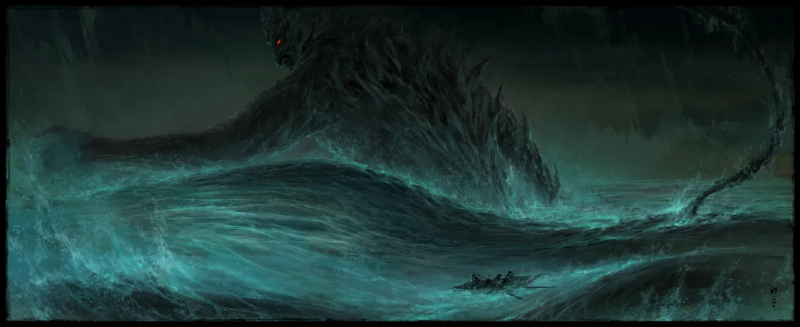Who, if anyone, or what, if anything, is in charge?
In many ways this is the question of the age, inspiring passionate debates across the ideological spectrum, with divergent answers springing not just from left and right but from every boutique micro-ideology howling within humanity’s splintered mind.
Dissident rightists talk about elite theory and the Cathedral, an emergent managerial structure sprawling across the institutions that coordinates itself with power-seeking talking points the way ant colonies use pheromones to swarm towards food supplies. Libertarians ascribe malign incompetence to the state and its lumbering bureaucracies, and to the central banks and their fraudulent fiat currencies. Accelerationists point to the blind idiot god of technocapital. Wignats talk about The Jews.
Conspiracy analysts finger the World Economic Forum, the bankers, the intelligence agencies, the reptoids. Christians speak of the Devil, gnostics of archons. The Woke rant about the invisible witchcraft of systemic racism, white privilege, cisheteronormativity, misogyny, and every once in a while, recall their origins with Marx and remember to blame capitalism.
What all of these have in common is that they remove the source of agency in public affairs from the visible to the invisible. It is not the politicians that we can see who coordinate the world and provide impetus to policy changes, but hidden puppet masters – human or systemic – who manipulate them from offstage. If there is a single, unifying theme around which most of the current year’s human species can coalesce across all ideological divides, it is this: the true power is hidden.

This state of ignorance encourages an uneasy sense of paranoia. We’re like travellers in a dark forest, unable to see more than a few feet into the shadows beyond a path we aren’t even sure we didn’t wander off some time ago. Every cracking branch in the undergrowth, every rustle in the leaves, every animal cry causes us to startle. It could be nothing. It’s probably nothing. But it could be a wolf. Or a bear. Or some eyeless monster from our childhood nightmares. It probably isn’t. It’s probably just a racoon. But you can’t see what it is, and your imagination fills in the details.
None of which is to say there aren’t monsters out there.
Secrecy in public affairs puts people on edge. You cannot trust what you cannot verify, and you cannot verify what you cannot see. There’s a reason that the archetype of the oily vizier whispering honeyed manipulations in a credulous king’s ear is universally reviled. Whether the king is a good king or a bad king, if he’s really the king, at least you know who’s in charge; you know the rules he follows; you know the customs that bind him, the ambitions that drive him, the personality that animates him. There’s a certain trustworthiness to that. The power that hides itself behind the throne is power that cannot be trusted.

Maybe the vizier is in truth a good vizier, giving the king sage advice, motivated only by his love of the kingdom and his desire for the general happiness and prosperity. But maybe he isn’t. Maybe he’s a serpentine traitor with a gnawing, insatiable hunger for power and wealth at the sadistic core of the sucking black singularity he has in place of a heart. The point is that, so long as he lurks in the shadows, you can’t really know, and your imagination will fill that null space of unknowing with your fears.
In the managerial state, power is deliberately opaque. We face not a single untrustworthy vizier, but armies of them, faceless bureaucrats and nondescript functionaries who camouflage themselves within the dense undergrowth of corporate org charts. Corner one of them over a decision you dislike, and they throw their hands up and say, it wasn’t me, I’m just following policy, or best practices, or mandates, or The Science, or whatever.
Try to trace the origin of the policy, and you find yourself in a bewildering web of think tanks, policy institutes, committees, and so forth, none of which is willing to take direct responsibility for the policy. Every once in a while you might manage to find a unique origin point, and almost invariably you find that it started as a simple suggestion, from some nobody with no particular power or influence, who simply put an idea out there which then took on a life of its own.
The lockdowns are a case in point. The idea seems to have originated with a middle school science fair project in which a tween ran a toy model on her computer that showed that if people were locked in their homes viral outbreaks could be prevented, an idea which is obviously true and equally obviously impossible in practice, and ruinous in direct proportion to whatever degree it is put into practice.
Early in 2020 it was popularized by some blogger whose name I can’t recall, who wrote something on Medium about dancing hammers which struck panicked midwits as very clever. Then it got picked up by the managerial network organism, turned into policy, and the world was broken.
The lockdowns are an extreme example, but really our entire system works like this. Take building codes. Wherever you live, there is a building code. It specifies in exact detail the best practices for every aspect of construction, and unless you follow it to the letter you will not be permitted to proceed with whatever project you have in mind, whether it’s erecting an apartment block or putting an extension on your deck.
Where did the building code come from? It wasn’t the building inspector: he’s just enforcing it. It wasn’t the mayor or the members of the town council: they wouldn’t know where to start. No, the building code emerged from some local bureaucracy, staffed by experts, who put together its elements on the basis of things that other experts said were good things to do. You don’t know their faces or their names. You will almost never track down the specific person who put a specific requirement into the building code. It was probably decided upon in a closed committee meeting, and no one on the committee will admit direct responsibility.
Indeed, the committee itself will not take direct responsibility: they were just following the best practices of other committees, modifying other building codes, in other municipalities. If you happen to disagree with some element of the building code – finding it overly restrictive, too cautious, too expensive for whatever marginal improvement in structural stability or energy efficiency it is intended to enforce – you have no way of changing it. The people on the committee weren’t voted into their positions. They don’t have to listen to the public, and therefore they don’t.
Meanwhile, within their sphere of responsibility they have absolute power to enforce their diktats. Maybe you can reason with them when exceptions to the building code arise, and maybe you can’t; that’s up to them, and not to you.
That’s a fairly trivial example, albeit one with implications for the housing crisis currently afflicting much of the Anglosphere. It’s illustrative of how our entire system works. We are governed by a sentient miasma of unaccountable regulatory authorities whose arbitrary powers extend into ever more intimate aspects of our lives like the pseudopodia of some vast smothering organism. Their power is seemingly absolute, yet there is never anyone responsible.

Who decided on the health code? Workplace safety regulations? Environmental protections? The rules governing public parks and beaches? The speed limit? Where you’re allowed to park? Where you’re allowed to fish? How many categories you have to divide your garbage into? The stupid rules you have to follow when you go through an airport?
More consequentially, who decided that our countries would cease to be nation-states, and would become the multicultural destinations of mass migration from the third world? Who made the call to break our economies with green energy policies? Was there a public debate? A referendum?
In principle, all of these things are meant to be voted on by legislative bodies, or decided by elected executives. In practice, it almost never works this way. Town councillors, mayors, state legislators, members of parliament, governors, prime ministers, presidents, and the like are mostly just implementing whatever they’re told by expert advisory bodies. Legislative packages for new regulatory powers are dumped on their desks, they skim it, say, eh, looks good to me, vote yay if that’s the party line of the day, and it’s off to the strip clubs and golf courses.
That’s assuming it even comes to a vote. In many cases, regulatory power is simply delegated directly to certain bodies, who make things up on the fly and set about enforcing them under colour of law.
Politicians in our representative democracy don’t really decide anything. They serve as a distraction. They’re leader-shaped appendages of the managerial state, dangled in front of the public in order to draw attention away from the shapeless cloud within which actual power resides. They provide brief little bursts of hope – this guy will really change things! – and when the shine inevitably comes off, they act as lightning rods for popular discontent. The relationship of elected politicians to the permanent bureaucracy is essentially that of an anglerfish’s bioluminescent lure to its giant, toothy mouth.

The entire system seems to be designed around maximization of the system’s ability to wield power, whilst diffusing responsibility such that identifying the actual source of power is nigh impossible, thereby shielding those wielding power on behalf of the system from any negative consequences of their decisions.
This obscurantist imperative shows up in the way the system’s functionaries use language. The technocratic prose deployed by the expert class is carefully scrubbed of any authorial voice. Identifying the person behind a given policy paper, scientific paper, white paper, or what have you, based on style alone, is essentially impossible.
Third-person passive predominates: they never say, “We have decided,” and certainly never say “I have decided,” but always “It has been decided,” as though policies are simply natural phenomena as inevitable as hurricanes, in which human agency plays no role. This reinforces the illusion that things are written, not by all-too-human scientists, but by Science; not by human journalists, but by Journalism; not by human agents, but by the Agency. It is the uninflected, lifeless, unified voice of the Borg.
The dead words with which they issue their pronouncements serve the purpose of occultation in ways beyond anonymization. It is deliberately boring, intended to cause the reader’s eyes to glaze over with disinterest. This narcotic effect stupefies the reader, makes him stop paying attention to what’s being said, and thereby defuses any opposition that might arise. It is also deliberately impenetrable: laced with euphemisms, larded with jargon, tying itself in circumlocutory knots to avoid directly saying what is being said.
A poet muddies his waters to sound deep, and a squid squirts ink in the water to avoid being seen. Rather than a clear statement of intent, the reader is presented with a bewildering and lightless labyrinth hiding the hungry beast at the centre, and lulled to sleep as he tries to navigate it.

The system’s operators do everything they can to avoid direct exposure to the public, protecting themselves behind layers of automation and minor functionaries. Towards the end of the lockdowns, as patience was wearing thin and tempers were fraying, it became common for chain restaurants that still insisted on masking or other nonsense to have signs at the front admonishing customers to please treat the staff respectfully, because they were not the ones who set the policy, simply the ones who must enforce it or lose their jobs.
This is intended to set up a no-win situation: the people you interact with physically did not make the decisions that outrage you, and the people making those decisions are hundreds of miles away and therefore quite beyond the reach of your outrage. It seems perverse to unload on some poor seventeen-year-old hostess who’s insisting that you must wear a mask to go to the table, but the only alternative to being a jerk (aside from just walking out) is to swallow your indignation and meekly comply.
This is a core strategy of managerialism: withdraw as much decision-making power as possible from the organizational periphery, and concentrate it in a location (or, increasingly these days, a dispersed work-from-home network) that never actually has to answer to the people affected by those decisions.
The Internet has enabled this insulation from the public to be crystallized in silicon form. Terms of service on social media and e-commerce platforms are altered on the fly; accounts are suspended, censored, deplatformed, shadowbanned, and so on, at the touch of a moderator’s button, with essentially no recourse. Complain to customer service, and assuming you even get a response, it is not from an identifiable person, but simply from ‘Trust and Safety’ or something. The respondent is protected both by distance and by anonymity, and therefore has no accountability to the user. In the era of Large Language Models, it isn’t even certain that you’re dealing with a human being at all.
A similar problem affects job searches: you can’t just show up at the place of work, present the owner with your resume, impress him with your moxie, shake his hand, and start the next day. Instead, your resume disappears into the black hole of online HR portals, to be reviewed (or not) by people (or not) who will never see you, and who in fact, even if you are hired, you will likely never actually meet and (unless you’re applying to work in HR) will certainly not actually work alongside.

Machine learning also promises to supercharge the cryptocracy’s responsibility-dodging imperative. Rather than passing the buck to other human beings, managerialists will simply be able to say that they are only following the suggestions emerging from the AI’s inscrutable layers of digital neurons; clearly, the AI cannot itself be responsible in any meaningful sense; and responsibility for its programming (and whatever goes wrong with it) is spread so thin between the teams of data scientists who curated its training data and supervised its training that none of them can be held responsible, either. A machine that programs itself, and whose inner workings are utterly illegible, is the ultimate in eliminating responsibility.
So far I’ve been concentrating on those elements of the cryptocracy that are most visible: the politicians, the regulatory state, and their counterparts in the administrative bodies of the private sector. These are, after all, the parts of the system that most of us interact with on a daily basis, and which are responsible for the everyday frustration of living under a thousand different petty tyrants.
No discussion of the cryptocracy is complete without examining the intelligence agencies, however. The bureaucracies rely on complexity to bewilder and obfuscate; the secret police are able to enforce their secrecy as a matter of law. If the bureaucracies are a kind of dense fog that wraps itself around the world, the intelligence agencies are the malign predators that move within that obscuring mist.
Spies have a certain glamour about them, but I very strongly doubt that spooks are anything like James Bond in practice. I suspect most of them are the same kind of blandly uninteresting nebbishes you find populating the more mundane elements of the system. Those that aren’t are mostly just organized criminals.
Thanks to the thicket of security clearances, need-to-know information, and compartmentalization, we don’t really have a clear idea of what they’re up to. Every once in a while something comes out, and when it does it’s usually bad: heroin trafficking out of Afghanistan; arms dealing to Iran; spying on citizens using the Five Eyes network; backdoor censorship of social media; Mockingbird infiltration of legacy media; MKULTRA abductions and mind programming; overthrowing popular governments via colour revolutions and other psyops.
What we know of their activities is almost certainly the tip of a very large and very dirty iceberg, one made of frozen sewage and toxic waste. Since we don’t know, the imagination runs wild: blackmail operations? Presidential assassinations? UFO coverups? Satanic rituals? Child sex trafficking? Honestly none of those would surprise me, nor I suspect would they surprise you.
Cloaking power behind layers of anonymity and secrecy provides fertile soil for rampant and thoroughly justifiable paranoia, but the seeming futility of trying to reason with or in any way influence power also engenders learned helplessness. You can complain, you can meme, you can shitpost, you can write long analytic essays grappling with the nature of the managerial state, you can do deep investigations into this or that conspiracy, you can demonstrate at length the misguided nature, lack of empirical footing, and obvious deleterious consequences of this or that policy, but none of it seems to have any effect.
It’s like fighting with mist. No matter how much you struggle, it just swirls around you. After a while, you stop struggling. Thus, the peculiar mood of our age: on the one hand, trust in institutions is at an all-time low, while suspicion as to the motivations behind institutional actions is at an all-time high … but on the other hand, there is a pervasive apathy, a sense that there is nothing that can really be done about any of it.
We have decision-makers who seek to absolve themselves of all responsibility for their decisions by spreading responsibility so thin that there is never anyone to blame, whilst simultaneously arrogating to themselves all decision-making power. They seek to deny their own agency by occluding it, whilst simultaneously stripping agency from everyone who isn’t part of the game.
And that, really, is where the answer to all of this is.
We can analyze the system as much as we want, without ever coming to any really clear answers. It is deliberately opaque, designed at every level to be as inscrutable as possible. But at the end of the day, as much as its operatives seek to conceal their humanity, all they are is human. They are as flawed and fragile as anyone else. Indeed, in many cases, when you actually see the misshapen goblins inhabiting the hidden recesses of the managerial system, it is striking what low quality humans they really are: visibly unhealthy, of middling intellect, riven by neuroses, with weak characters, deeply insecure, and unhappy.
Their system of control relies largely upon a game of make-believe. They pretend that they have power, they pretend that it is justified because they are highly competent, and they pretend that they use their power in order to keep us safe, to save the planet from climate change, to fight racism, to stop a virus, or whatever. The rest of us pretend that these things are genuine concerns, pretend that those threats are adequate justification for arbitrary rule, and pretend that the people making the decisions know what they’re doing. They are powerful, and so issue mandates, and we comply; and because we comply, their mandates work, and so they are powerful.
But what if we just … stopped complying?
Sure, people would risk fines, maybe even jail time in some cases.
But we’re already living in an open-air prison in which you need to seek permission before doing anything consequential, while the administrative overburden of the managerial state has long since become a crushing financial weight. Taxes are outrageously high, but even beyond that, there’s the increase in costs due to all of the useless eaters working their bullshit jobs, sending emails back and forth, filing reports, attending meetings, and whatever other makework it is that they occupy their time with in order to ensure that as little actual work gets done as possible.
How much of the workforce is currently employed by the government, or in administrative positions in the private sector? How much does it all cost? Who’s paying for it?
So long as this system stays in place we’re all serving a permanent jail sentence, and paying a permanent and onerous fine.
The system is maintained, fundamentally, by our collective agreement that it’s a good system, or at any rate better than the alternatives. Sure, building codes might be annoying, but it’s better than having buildings collapse, as buildings surely would without building codes. Workplace safety regulations might be a hassle but we don’t want people dying on the job. And so on.
Personally, I don’t think any of that is really true. We’ve been building structures for much longer than we’ve had building inspectors, and the desire of people to not have their buildings collapse on their heads, and of tradesmen and architects to not be known as the builders and designers of unstable structures, goes a long way towards ensuring structural stability.
The endless impositions of the regulatory state justify themselves on the basis of their indispensability to avoiding bad outcomes, but we avoided bad outcomes without them for most of our species’ history. Indeed they’re a recent innovation – mostly introduced within the twentieth century, and much of the apparatus is less than a generation old. I suspect we could do away with almost all of it and barely notice. Well, that’s not true. We would notice the difference very quickly, and for the better.
That’s the first shift in mindset that we need: from the idea that the cryptocracy is a necessary evil, to the idea that it is evil, and not necessary at all.
Following that, it’s simple: ignore them.
If no one is really responsible for anything, then no one’s really in charge. In that case no one really has any legitimate authority. So why listen to them when they tell you to do something? When they say ‘This is policy, now’ or ‘It’s written here that you have to do this,’ maybe think about just, you know, disobeying.
As an example, take Ian Smith, co-owner of the Atilis Gym in New Jersey. During the 2020 lockdowns he told the governor to go fuck himself, and kept the gym open. When the cops came and locked the doors, he kicked the doors down. When he racked up $1.2 million in fines, he refused to pay; so far he’s been able to get the fines reduced by an order of magnitude in the appeals court.
There were a few other heroes like Ian Smith during the lockdowns, but if we’d had a few hundred thousand like him, there wouldn’t have been any lockdowns. There would have been no social distancing, no essential workers, no mask mandates, absolutely none of it, if people had simply refused to comply. On his own, Smith couldn’t stop it, and could be made an example of. No one wants to pay a hundred and twenty thousand dollar fine, obviously. But if he’d been party of an army?
Take the stupid rituals at airport security – removing your shoes, giving up your liquids, opening your laptop, and all the rest of the pointless theatre that hasn’t stopped a single terrorist attack. Refuse to go along with it yourself, of course, and you’ll get tazed, detained, prevented from boarding your flight, and probably put on a no-fly list. But what if absolutely no one in the airport agreed to do it, and simply zerg-rushed the security gate? Not just at one airport, but at all of them? The TSA would be a dead letter the next day.
Take what just happened in New Mexico. The governatrix, apropo of nothing, abruptly decided the Second Amendment didn’t exist because firearms are a public health emergency. New Mexicans responded with a very large and very public open carry display, and the state’s law enforcement announced that they would not enforce unconstitutional orders. That was it for her authority.
This basic principle of not automatically doing what you’re told, and sometimes deliberately not doing what you’re told for no other reason than that you were told to do it, would go a very long way towards reestablishing some semblance of freedom in the Western world.
Use disobedience to claw back whatever personal agency and responsibility you can in your own life, train yourself not to take these people seriously, encourage others to do the same, and if enough people do this, eventually it will become so prohibitively expensive to manage the population that the strangling vines of this parasitic organism we call the managerial state can be hacked back to something manageable.
Republished from the author’s Substack
Published under a Creative Commons Attribution 4.0 International License
For reprints, please set the canonical link back to the original Brownstone Institute Article and Author.









